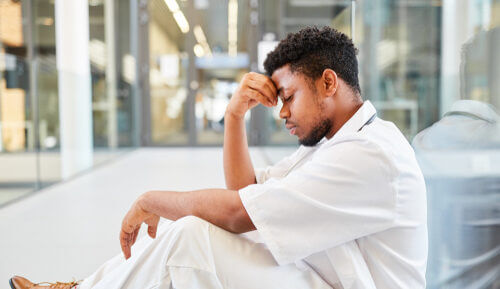
Page contents
- What challenges do LGBTQ+ bereaved people face?
- Discrimination
- Strained or estranged familial relationships
- Exclusion from discussions/decisions
- Legal and financial issues
- Steps you can take to talk about your grief
- What support groups can help LGBTQ people with bereavement?
- Seek professional help with bereavement
- Other help and LGBTQ support with bereavement
Page contents
- What challenges do LGBTQ+ bereaved people face?
- Discrimination
- Strained or estranged familial relationships
- Exclusion from discussions/decisions
- Legal and financial issues
- Steps you can take to talk about your grief
- What support groups can help LGBTQ people with bereavement?
- Seek professional help with bereavement
- Other help and LGBTQ support with bereavement
What challenges do LGBTQ+ bereaved people face?
Some LGBTQ people may not have the conventional support that the rest of society have when they suffer a bereavement.
Discrimination
Despite the huge steps that have been made over recent years for the community, LGBTQ+ people facing the loss of a partner often experience negativity or discrimination from others. For example, this can include a lack of, or a resistance towards, acknowledgement of the relationships or their sexual identity. For example, research shows that 17% of lesbian and bisexual women have experienced discrimination, hostility or poor treatment because of their sexual orientation when using GP services.
Strained or estranged familial relationships
Many people from the LGBTQ+ community have difficult relationships with their families. A report published in M<2015 found that less than a quarter of lesbian, gay and bisexual people see their biological family members at least once a week compared to more than half of heterosexual people. Because of this it can be difficult to get the support they need from their family members during a challenging time. For example, if a person’s family have not accepted their partner, they will likely not empathise with the loss of this person, making it difficult for a person to share their grieving experience.
Exclusion from discussions/decisions
LGBTQ+ people can often face barriers to involvement in key decisions relating to their partner’s health and medical requirements, this may be from family members who are unwilling to accept the person’s role in their loved one’s life, or it can sometimes come from a lack of understanding from medical professionals. 14% of lesbian and bisexual women and 7% of gay and bisexual men have been excluded from a consultation or decision-making process with regard to their partner’s health or care needs. This exclusion adds unnecessary stress to the situation, devalues the relationship, and can leave the remaining partner feeling completely disregarded.
Legal and financial issues
Sorting out finances after the loss of a partner can be difficult for anybody, especially if the person doesn’t have a will. Family discrepancies add extra complications to the legal and financial proceedings following a death, and can cause problems for the remaining partner in receiving what they are entitled to.
If you have lost a partner and are struggling to cope with your grief, there are steps that you can take to help guide you through the process and hopefully reach a point where you can begin to feel positive about your future.
Steps you can take to talk about your grief
- Don’t avoid telling others if you’re having a bad day. Following a loss, some days will inevitably be hard. Being honest about this lets others know how you are doing and they can work with you to get through the darker times. It should be the same with good days too, thinking about positive things about the person you have lost or celebrating milestones can sometimes help to reintroduce more positive moments into your life. Embrace the days you feel more positive, and speak about this too.
- Try to celebrate the life of the person you have lost whilst also recognising your grief. Things such as simply talking to friends about the person, the things they enjoyed doing, or good times you experienced together will help to keep the memory of them alive and remind you of all the good times you’ve had.
- Tell your friends what you need from conversation. Perhaps you’re not ready yet to talk about the positive times you had with your loved one, or you’d rather focus on your friends and what’s going on with them for the time being. Being open with what you want will, in turn, help your friends to understand what you need from them and make those discussions more valuable to your grieving journey.
What support groups can help LGBTQ people with bereavement?
There are a range of groups which work to support LGBTQ+ people through the loss of a partner as well as other difficulties they may be facing. Support groups are accessible across the UK, both online and in person.
Examples of support groups that will be able to support LGBTQ people with bereavement:
MindOut
Based in Brighton and Hove, MindOut offers peer support groups which are completely confidential and run by LGBTQ group facilitators.
These groups provide opportunities to:
- Meet other people with shared experiences and shared identities
- Create a safe and supportive space to share how you are feeling
- Use shared experiences and identities to give and receive support
- Help reduce loneliness and isolation and share coping strategies
MindOut offer both in person and remote groups, meaning that people outside of the local area can access them too.
Outcome
Outcome, run by Islington Mind, is one of few LGBTQ+ only mental health services in London. It is a client-led service run by people of the community and has been around for 15 years. They host a range of activities including support groups, walks, creative classes, gardening and much more. Their aim is to provide a space where people from the LGBTQ+ community can seek support and friendship in a safe and inclusive space, “free from discrimination or feeling like the ‘odd one out’”. They host both in person and online events, making the services accessible across the UK.
Cruse
Cruse offers bereavement support to anybody grieving the loss of a loved one, no matter how far along the journey they are or their personal circumstances.
Their support includes:
- Help with understanding grief
- One-to-one support
- Supporting children and young people
- Practical support for what to do after somebody dies
Although Cruse offers support to anybody who is grieving, not exclusively the LGBTQ+ community, they are sensitive to the particular issues LGBTQ+ people face when they lose a loved one. They are taking active steps to learn directly from the community how they can better support people through grief and create an inclusive environment for everybody.
Opening Doors
Opening Doors is the largest programme in the UK for older LGBTQ+ people. It is a national charity which connects members of the community to activities, events and support. Whilst these are not specific to supporting people through grief, they will provide opportunities to meet up or talk with people who have shared experiences, and help you to find the support you need as you process the loss of your loved one.
Visit their website to find out more about the different groups in your local area.
Age UK
Across the UK, Age UK run support groups for older members of the LGBTQ+ community. Like Opening Doors, these support groups are not specific to grief, but provide opportunities for people of a similar age, with similar experiences, a chance to meet up and chat, share their stories, as well as socialise and have fun.
You can find more information about the location of Age UK support groups on their website.
Grief Encounters
Grief Encounters is a support group for LGBTQ+ people who have experienced a bereavement.
They arrange informal meet ups, often focusing on a creative outlet, to give people the opportunity to explore their grief and spend time with others who are going through similar experiences.
Speaking of their time with the group, a member of Grief Encounters said:
“I found the grief encounter group really, really useful. My wife died six months ago and I was devastated but so was everyone around me. When you go to the traditional groups you’re very much alone with the experience of being gay. Whereas when you’re in an LGBT group, everyone knows, they understand because they’re in that place. It was a safe space for us to just talk about our loss.”
Seek professional help with bereavement
If you are LGBTQ and really struggling to cope with a bereavement, it might be a good idea to seek support from a professional. Like support groups, there are counselling and therapy providers who cater their services specifically to the LGBTQ+ community, ensuring that you don’t have to worry about finding a professional who understands what you are feeling.
- Cruse Bereavement Care: 0808 808 1677
- Cruse Bereavement Care Scotland: 0845 600 2227
- Lifeline (Northern Ireland): 0808 808 8000
- Marie Curie Support Line: 0800 090 2309
- Marie Curie Telephone Bereavement Support: 0800 090 2309
- Samaritans: 116 123
- Supportline: 01708 765 200
- Switchboard LGBT+ Helpline: 0300 330 0630
Pink Therapy also run an online directory where you can find a list of therapists who actively work with members of the LGBTQ+ community.
Other help and LGBTQ support with bereavement
Support through a terminal illness if you are LGBTQ+
Your legal rights if you have faced discrimination


